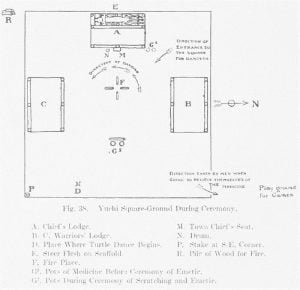Yuchi Indian Tribe
The Yuchi have attracted considerable attention owing to the fact that they were one of the very few small groups in the eastern part of North America having an independent stock language. Their isolation in this respect, added to the absence of a migration legend among them and their own claims, have led to a belief that they were the most ancient inhabitants of the extreme southeastern parts of the present United States. The conclusion was natural, almost inevitable, but the event proves how little the most plausible theory may amount to in the absence of adequate information. Strong evidence has now come to light that these people, far from being aboriginal inhabitants of the country later associated with them, had occupied it within the historic period.

